
A silver-haired eccentric in something resembling a black turtleneck and glasses stands tall on a stage. The gathered crowd of privileged invitees hang on his every world, looking up with rapt attention as he spells out his vision for the world. "What do I expect in return? Worldwide domination. Complete, utter, total worldwide domination," he bellows to confused looks. "But not over governments or religion or ideology. Over tyranny and isolation and ignorance. I promise to report the news without fear or fervor. I promise to be a force for good in this world. Fighting injustice, crushing intolerance, battling inhumanity, striking a blow for freedom at every turn."
No, it's not Steve Jobs going a bit megalomaniacal at an Apple launch. Nor is it Rupert Murdoch or Ted Turner at a Fox News or CNN event. It's not even some guy named Ted at a TedTalk. It's Elliot Carver - a Bond villain played by Jonathan Pryce in 1997's Tomorrow Never Dies. Words are his weapons; satellites his artillery, or so the film's screenwriter Bruce Feirstein argued. Prior Bond villains wanted the gold in Fort Knox, atomic weapons, control of the oceans, even control of outer space - Carver just wants bigger ratings, and he'll secretly provoke WWIII just to get them! Plus, he demands exclusive access to the Chinese market.
In 1997, that might have seemed a tad alarmist, overly cynical, or just plain weak compared to the franchise's more typical big bads. Today, it plays as almost uncomfortably prescient. How does the rest of the film hold up? Well....
A Truly Golden Touch
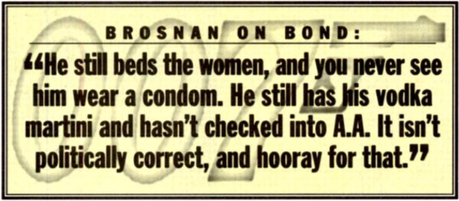 From Cinefantastique 27 n3 (1995).
From Cinefantastique 27 n3 (1995). That was Pierce Brosnan's cheeky reply when asked by a magazine writer on the set of GoldenEye how they planned to update Bond for the 90s. It's not that he wasn't worried about how to do a Bond movie in a post-Cold War world nor was he completely blind to the changing cultural whims of the time. Quite the contrary. Bond, however, had to remain distinctly Bond, and if they could update him just enough for the PC 90s without resorting to radical reinvention audiences would probably go along with it. "I would love to be responsible for revving up the Bond engine internationally again. Bond is a homegrown British product, and it would be great if I could make him a worldbeater again," Brosnan said.
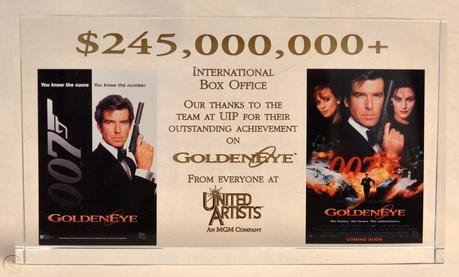 Expectations, Shattered.
Expectations, Shattered. Audiences couldn't get enough of the film and an entire new generation of fans was about to be hooked by the instant-classic video game tie-in, which didn't hit the N64 until 1997. MGM understandably wanted more, but patience was not an option.
Great! Now, More of the Same But Quicker and More Expensive
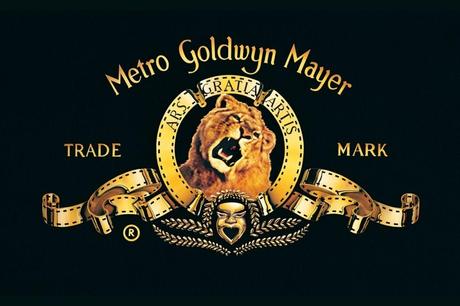
MGM was preparing a public offering for just two years down the line, and the next Bond movie had to be out by then to help boost the company's valuation. As a result, Tomorrow Never Dies got a release date before it even got a start date.
When would filming start? Who's going to make it? What's it even about? / No idea - it just has to be out by the end of 1997. Work backwards from there.
In the words of a character from another 1997 film about big brother:
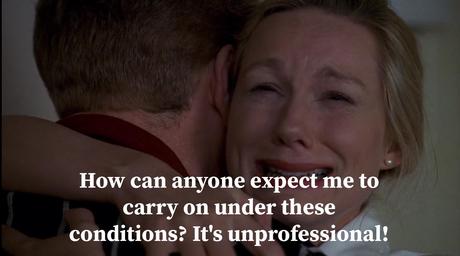
Those probably aren't the exact words GoldenEye director Martin Campbell used when he turned down EON's offer to return for a sequel with no script, no ideas, and an inflexible two-year-timeline. After all, I am exaggerating just a little bit for effect here. Campbell did politely pass, though, moving on to The Mask of Zorro instead. His actual reason: "I felt after I'd done GoldenEye, maybe mistakenly, I didn't want to repeat it." His replacement, Roger Spottiswoode, was Sam Peckinpagh's old editor who had transitioned to directing projects like And the Band Played On, Turner & Hooch, and Air America. Spottiswoode's big challenge was simply getting Tomorrow Never Dies done on time without anyone killing each other.
Ripped from the Headlines

Tomorrow Never Dies was greenlit six months before GoldenEye hit theaters, giving EON and MGM ample time to solicit story ideas from The Hunter novelist Donal E. Westlake ("What if we start off in Transylvania?" was one of his pitches) and GoldenEye co-writer Bruce Feirstein. They each independently looked at Britain's looming return of Hong Kong to Chinese control (set to happen July 1, 1997) and saw an opportunity for the first ripped-from-the-headlines James Bond movie. Westlake's ideas were ultimately rejected and later published as the standalone novel Forever and a Death. Feirstein, meanwhile, plowed forward with his first draft and outlined the following story:
"Media tycoon, Elliot Harmsway, is enraged by Britain's cowardice in returning Hong Kong to China and intends to destroy the colony before the handover, while his media empire will benefit from worldwide coverage of the disaster."
For the record, "Harmsway" is so on-the-nose that it feels kind of perfect for a Bond movie. I wish they'd kept it. I'm not sure when that was changed to Carver, but the Hong Kong Handover plot was dropped the moment the script was sent to a consulting agency headed by Henry Kissinger. Jeff Kleemen, MGM/UA executive vice president of production at the time, recalls the script was vetted by Kissinger "so you don't have a situation like we had on GoldenEye where we are a few days into shooting in London and the Militsiya comes out and we have to go back to London."
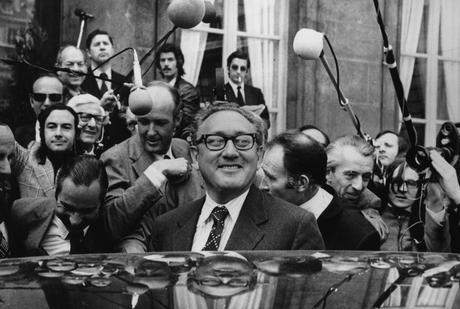 Kissinger - Secretary of State, National Security Advisor, Bond Consultant
Kissinger - Secretary of State, National Security Advisor, Bond Consultant Kissinger's take: what are you going to do if something bad actually happens during the Handover? You don't know the answer, and that's why you shouldn't try to fantasize an event that will only be a few months old by the time you hit the market.
Fair point. Also, shit, now we need a page one rewrite, and Harmswell needs to become more of a Robert Maxwell type - a Murdoch competitor who once ran a media empire that included, among others, the Daily Mirror. That was but the first of many, many setbacks.
Define "Troubled Production"
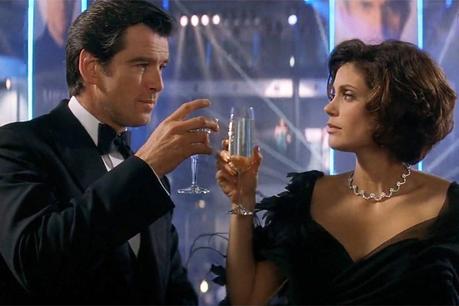 Hatcher on her character Paris Carver: "It's such an artificial character to be playing that you don't get any special satisfaction from it."
Hatcher on her character Paris Carver: "It's such an artificial character to be playing that you don't get any special satisfaction from it." Bond and one of his Bond girls (Teri Hatcher, cast over Brosnan's preferred choice Monica Belluci) didn't get along. They kept firing and rehiring Feirstein, becoming one of the first Hollywood blockbusters to employ a writer's room only to then discard most of their ideas. (One idea that stuck: changing the film's second Bond girl into a female Asian agent on par with Bond.) Spottiswoode got into shouting matches with seemingly everyone and eventually wasn't on speaking terms with Judi Dench. A significant chunk of the production schedule was thrown into chaos when the government of Vietnam ripped up the country's agreement with the studio while the director and his department heads were literally at an airport about to board a flight to Ho Chi Minh City.
"It was awful. We were stuck at the airport with sixty people and we were supposed to start shooting in three weeks. A third of the movie was on locations we no longer had," Spottiswoode later recalled. Thankfully, Spottiswoode and several of his crew had made Air America in Thailand seven years earlier. Based on that experience, they diverted their flight to Bangkok and promptly scouted Thailand locations that could double for Vietnam. "Between us all, we said this is the only way to keep the film going, makes our dates, and keep moving."
MGM had planted the film's flag on Christmas Day 1997. Spottiswoode's late stage plea to delay to 1998 was shouted down. Christmas 1997 or bust! What else is coming out that day, anyway?
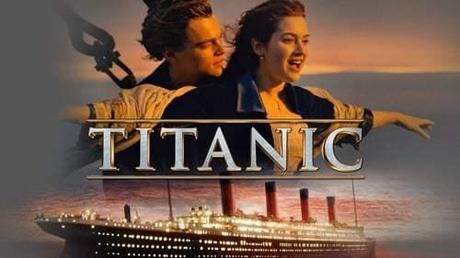 Come on!
Come on! "Bond must beat the boat and save the lion" read Variety's concise summation of the latest Bond adventure's need to somehow topple Titanic AND save MGM.
A Movie About Fake News Beset by Fake News
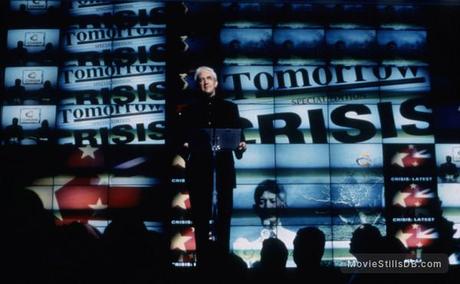
Through it all, there was the press reporting on every little rumor. "All the problems were fabricated by the `wonderful' British press," Jonathan Pryce lamented while promoting the movie. "We would phone and say, `You've got it wrong,' and the falsehoods would continue," If not, ironically, for Titanic's historically troubled production Tomorrow Never Dies probably would have been the film media's favorite whipping boy of 1997.
Not all of the little accidents along the way were so drastic. Take, for example, the title. Originally called Tomorrow Never Lies after both the Beatles song "Tomorrow Never Knows" and the name of Carver's fictional newspaper, a secretary at the studio accidentally typed it up as Tomorrow Never Dies but everyone thought that sounded better. It's probably the lesser of the two titles, but at least it's not a "Vietnam just tore up our contract"-level headache.
Looking back on it now, Feirstein is sanguine. "You were in the heat of it back then and you think this has never happened to anybody before in the whole world. It was a movie that was rushed into production. We all had guns to our head and there was a lot of tension," he told the authors of Some Kind of Hero. "The truth is, this happens on a lot of movies. [Producers] Michael [Wilson] and Barbara [Broccoli] never panicked. 20 years ago, I would have used the over-wrought description that it was like 'changing engines on a Concorde mid-flight' but since then I've been on a number of movies that have been exactly the same."
Yeah, But Is the Movie Any Good?
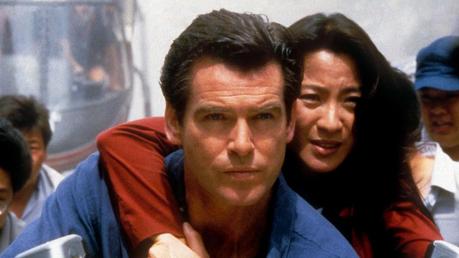
Out of all that chaos came a...really divisive movie. Though initially liked by critics and greeted to a box office cume basically on par with GoldenEye, Tomorrow Never Dies has since been kicked around by Bond fans. Mark A. Altman and Edward Gros, for example, wrote an oral history book - Nobody Does it Better - about every Bond film, and their Tomorrow Never Dies chapter opens with the following admission: "Even the authors of this book have diametrically opposing opinions of the finished film. Gross considers it a high-water mark for the Brosnan films; Altman despises the movie."
I started out an Altman and ended up a Gross. That sounds weird. Let me try that again.
On first watch, I wanted to like Tomorrow Never Dies more than I did. For all of its "media moguls are the new Bond villains" prescience, it still felt somehow undercooked. Teri Hatcher's Paris Carver - the answer to "What happens to a Bond girl when he's done with them?" - just didn't work for me, too little-seen and under-explained to matter. Upon rewatch, however, I settled into a deeper appreciation for the pure fun of Tomorrow Never Dies as a super efficient, two-hour action movie.
Like a lot of modern video games or Marvel blockbusters, they wrote backward and came up with action scene ideas for the crew to work on for months before they actually had a story. Sometimes, that lack of depth shows. Most of the time, however, it ensures the film zips along from one impressive and practical stunt to another while always being anchored by Brosnan's commanding central performance. I get a particular kick out Bond using his latest Q gadget to remote-control drive his BMW around tight cark park corners as his pursuers fail to keep up.
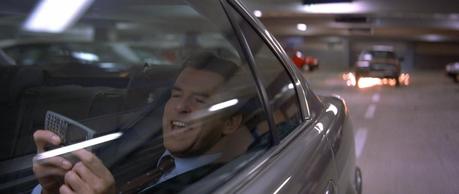 I know, it looks like he's texting, but he's actually using something awfully close to a touch screen to drive the car from the backseat.
I know, it looks like he's texting, but he's actually using something awfully close to a touch screen to drive the car from the backseat. Like a lot of the Brosnan films, however, Tomorrow Never Dies is ultimately ruled by its attempt at a modern Bond girl. Hatcher's ex-girlfriend character was Brosnan's request to give Bond a love interest with a shared past, a way to peel back the layers of the dramatic onion and deepen the character, but the pair ultimately fizzle together.
Michelle Yeoh's Wai Lin, however, is so competent, self-assured, and generally badass you get the sense that if she was in the film any longer they'd struggle to come up with things for Bond to do. The film flinches at the end and forces the pair into a traditional Bond-Bond Girl kiss, but the concept of a Chinese Bond with her own gadgets - and even, in a sadly unfilmed scene, her own Q - certainly risks coming off as trend-chasing. You could certainly see this as a creaky old franchise trying to glom on to the emerging Hong Kong action genre, but all I really see is two actors - Brosnan and Yeoh - with great chemistry and a small army of stunt people somehow making something as astoundingly awesome as this:
With sequences like that, no wonder this franchise's tomorrow - wait for it - truly never dies.
The Marathon Notes
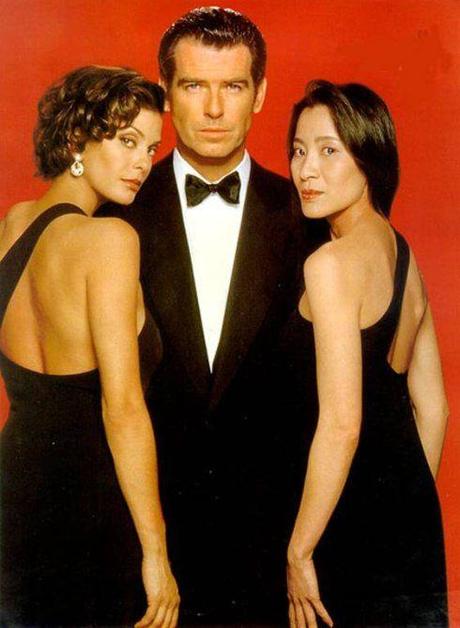
- Thoughts on the Bond Women: Paris Carver is a better character in theory than execution and suffers considerably from - spoiler! - created-just-to-die syndrome. Wai Lin, on the other hand, is a far better take on " female Bond" than what they tried again several years later with Halle Berry. After the film's release, they reportedly kicked around the idea of a Wai Lin spinoff movie. I would have watched that.
- Ian Fleming Connection:The first Bond film to have no story or title connection to Fleming.
- Bond Song Thoughts: As with many modern Bond flicks, Tomorrow Never Dies actually has two songs, one for the intro and another for the closing credits. Between the two, I prefer K.D. Lang's big band ballad - "Surrender" - with its John Barry, brass section, throwbacks over Sheryl Crow's tamer "Tomorrow Never Dies." In truth, I dig both.
- Coolest Scene: Brosnan and Yeoh on a motorbike built for two.
- Favorite line: Carver: The distance between insanity and genius is measured only by success.
- Biggest regret: They could have had Monica Belluci in 1997 and didn't cast her until 2015.
- Little Known Fact: According to the director's commentary, Ricky Jay asked Spottiswoode if he could have a little speech prior to his death scene since his control room henchman character had been so underdeveloped. The director agreed to let Jay - who was mainly hired based on his magician's ability with cards, an ability that translated poorly to screen and ended up cut from the film - write a little something. They ran it past Pryce, who nodded politely. When it came time to film the brief speech, however, as soon as Jay opened his mouth Pryce pointed the prop gun at him and shot, as had been the original plan. Jay - stunned, but still a professional - fell straight to the ground. Pryce's explanation: "I didn't like the first few words I heard and shot him. What, I'm staying in character!"
- Box Office: $333 million worldwide ($532.7m adjusted for inflation)
Sources: Nobody Does it Better, The Ultimate Guide to Bond, Some Kind of Hero, Cinefantastique, DVD Director's Commentary

